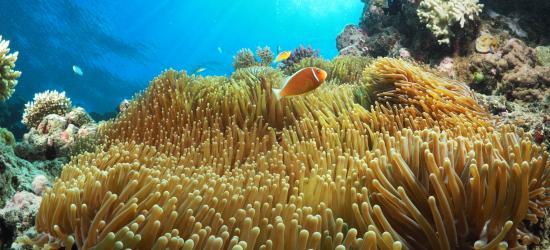Degraded coral reefs are far quieter than five years ago, and no longer sound like suitable habitat to young fish searching for a place to live and breed, according to the latest research.
Baby fish looking for a home can use noisy coral reef sounds including snapping shrimp clicks, damselfish chirps, and clownfish chattering to locate and select suitable habitat.
But that “coral reef orchestra” has been quietened following three years of cyclone and coral bleaching damage on the Northern Great Barrier Reef.
An international team of scientists have carried out field experiments on reefs surrounding Lizard Island on the northern Great Barrier Reef.
The study found the soundscapes of recently degraded reefs attracted 40% fewer fish compared to the sound of healthy reefs.
Australian Institute of Marine Science fish biologist Dr Mark Meekan, an author in the study, said this loss of attractiveness of reef sounds to fish could have devastating consequences.
“Reef fish disperse their young away from reefs in open water to help the larvae survive, and once they develop into juveniles, they have to find their way back to a reef,” Dr Meekan said.
“It is a fairly complex story and people are surprised to hear reefs are very noisy places.
“If juvenile fish aren’t hearing their way home anymore, that could be bad news for the recovery prospects of reefs.
“A reef without fish is a reef that’s in trouble.”
Dr Meekan said the coral reefs ‘soundscape’ can be heard for miles around and provides a valuable cue for young fish to locate and select habitat after a period of early development in the open ocean.
Dr Meekan said loss of reefs was a worldwide problem which is why the team of scientists from AIMS and James Cook University, along with lead research scientist Tim Gordon from the University of Exeter (UK), the University of Bristol, and Duke University (USA), got together to build experimental reefs from coral rubble on sand flats.
They then used underwater loudspeakers to broadcast healthy coral reef sounds or degraded coral reef sounds over two months, to see which sounds attracted more young fish.
“We have marvelled at the remarkable diversity and complexity of coral reef soundscapes but if the reefs have gone quiet, then the chances of the next generation of fish recolonising the reefs are much reduced.
“It raises the potential for remediating reefs, to use noise to help reefs rebound quicker,” Dr Meekan said.
Dr Gordon said major weather events were happening worldwide four times more frequently than they used to.
The research paper entitled: “Habitat degradation negatively affects auditory settlement behaviour of coral reef fishes” is now published in the Proceedings of the National Academy of Sciences (PNAS).
Photos and footage available:
https://www.dropbox.com/sh/s146nqpsf0yh8m8/AACKSgjgCnoCJS0u2O5z3ttPa?dl=0
Media contact:
Emma Chadwick
Australian Institute of Marine Science
Media officer
0412 181 919 or e.chadwick@aims.gov.au
Dr Mark Meekan
0429 101 812 or m.meekan@aims.gov.au
Exeter University Dr Tim Gordon UK
07707 659 528 or tg333@exeter.ac.uk
Photo courtesy of C.Brunner, JCU@AIMS

